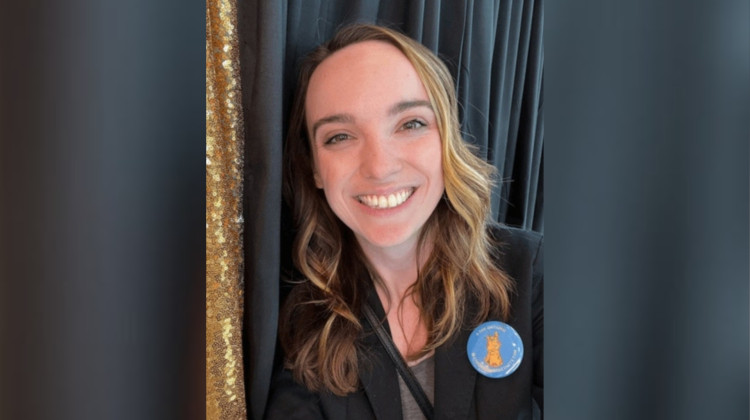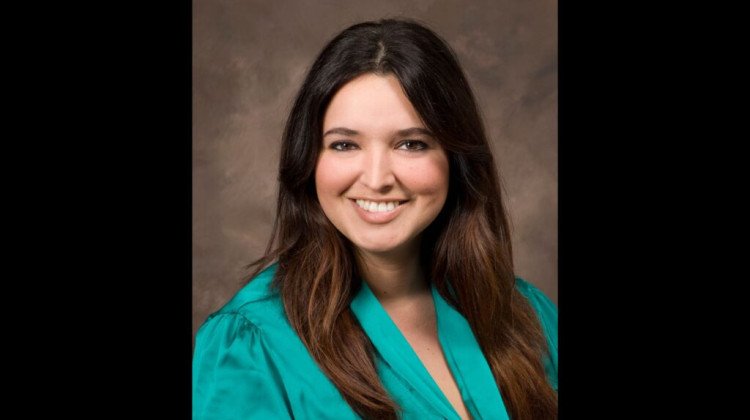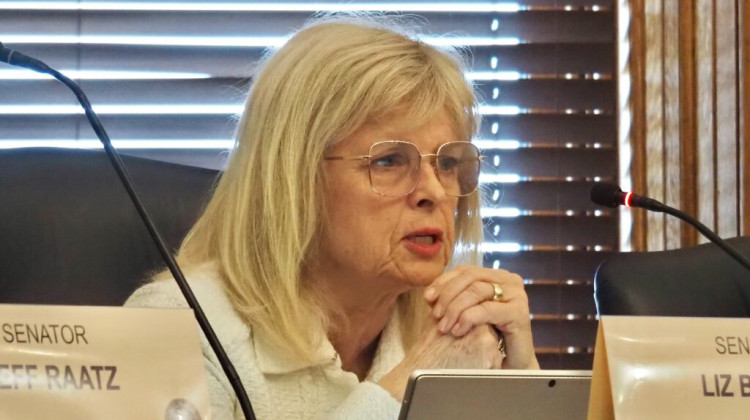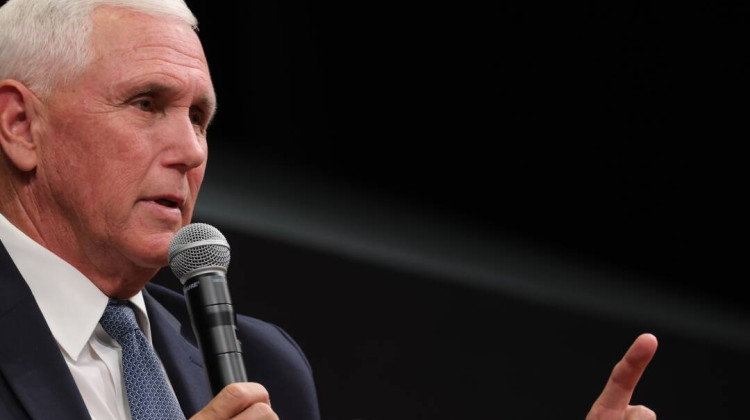
Ashley Groff works in the heating and air industry. This is her first time running for office.
Courtesy of Ashley Groff's campaign websiteWFYI is speaking with U.S. House of Representatives candidates running for election in Central Indiana.
Ashley Groff is the Libertarian running for election in Indiana’s 4th Congressional District, which represents a large western area of the state including Martinsville, Crawfordsville and Lafayette. She faces Republican incumbent Jim Baird and Democrat Derrick Holder.
Groff works in the heating and air industry. This is her first time running for office.
WFYI's Zak Cassel sat down with Groff to discuss why she's running for the seat.
This transcript has been lightly edited for clarity and style. WFYI fact checks all candidate interviews and provides editor’s notes in the audio and digital publications.
Zak Cassel: I want to just jump right in. I want to start out with a broad question. Our country is facing multiple crises in politics, the economy, social issues such as abortion, and more. If you’re elected to represent Indiana’s Fourth Congressional district, what will your top legislative priorities be?
Ashley Groff: I think the biggest thing is gonna be to cut government spending. I think that a lot of the things our government is currently spending our money on is unnecessary, it’s excessive, and I — it just hurts the American people more than it helps them.
Cassel: Can you name some of the things that we are spending too much money on? And what are your policy proposals?
Groff: So, specifically, I think a lot of — incredibly too much money is spent on unnecessary research in… like health care, things that don’t really make a difference or may be unnecessary testing, and insurance, that’s another big thing that I have — would like to see changed. So, for example, I do have a son who is special needs, and he has a lot of health concerns. He does take medications, and it’s really, really difficult most of the time to get the medicines that he needs so that he can take them on a consistent basis just to function.
And I think it’s a really big problem because I shouldn’t have to, you know, call around to multiple different pharmacies just to get something that he needs to function, because the government has decided that this specific drug that he needs is, you know, a hard drug, and so companies can only produce so much of it. And then when more people need that drug, it just — it makes it harder for people to get the things that they need.
Cassel: I want to get more specific. Your congressional district is pretty rural. Your Republican opponent, incumbent Rep. Jim Baird, sits on the House Agriculture Committee. The so-called farm bill is a major piece of legislation but Democrats and Republicans have strongly disagreed on the bill’s renewal. The farm bill includes financial assistance to farmers and funding for research. But the Republican-backed proposal makes significant cuts to SNAP, or the food stamp program, by some estimates $30 billion. It also removes climate-forward requirements farmers must meet to access certain financial assistance. These proposals are opposed by Democrats who have put forward a competing bill in the Senate. If elected, what agriculture policy priorities would you pursue and how would you work to overcome partisan gridlock to pass legislation?
Groff: I mean, at the end of the day, it really just boils down to government needs to stay out of it, at the end of the day. You know, we’re a capitalist society, and government has — instead of letting the free market work the way that it’s supposed to, and let the local communities handle agriculture and profits and other things like that on their own, in the way that they know how, in order for them to thrive and grow.
Government stepping in because they feel like they need a cut, and they just… there’s more barriers in place that are hurting people rather than helping people. At the end of the day, I think that government just needs to stay out of it, and that’s something that I would really push for.
Cassel: Would you consider cuts to the food stamp program and removing climate requirements to access financial assistance in order to pass legislation that would help farmers?
Groff: I’m sorry, can you repeat the question?
Cassel: Would you consider cuts to SNAP, or the food stamp program, and removing climate requirements to access financial assistance in order to pass legislation that would help farmers?
Groff: I would oppose that. I would oppose cuts to any restrictions on the communities that would prevent them from growing their food and from people getting the necessary benefits that they need.
Cassel: Purdue University puts out an annual report on climate impacts in Indiana and indicates that some of the greatest risks in the state will come from hotter temperatures, increased rain, and flooding. Nationally, the past 10 consecutive years have been the hottest on record since 1850. Heat waves have resulted in deaths across the country. How would your overall policies address the impacts of climate change?
Groff: Yeah, I think that honestly, some of the — a lot of it boils down to a lot of the companies that are currently working with the government are actually paying them to, you know, keep themselves in business, and I don’t think that’s very right. I don’t think that the government should be bought out to benefit other companies if it doesn’t benefit the American people, so at the end of the day, again, government just really needs to stay out of it.
I think that the free market should be allowed to do what it does best, which is to — if people have an idea for a way to fight climate change, such as flooding, they can make their own company very easily and have the funds and the people that they they need in order to function to make their communities better.
Cassel: So climate change is a global problem, and everybody will be facing impacts. Are you saying that the government does not have a role in addressing that?
Groff: I think they do to some extent, but I think the way they’re going about it is the problem.
Cassel: Could you say more?
Groff: So, for example… [pauses] I’m sorry. So, for example, I mean having different companies that — lobbyists that go to the government and say, 'I’ll pay you this much money if you vote to pass these bills,' and they agree to it, I don’t agree with it, I don’t think that that’s right at all, and I don’t think it benefits anybody except for the companies and the people that are voting for these bills.
Cassel: During the 2020 election's certification process, your opponent Rep. Jim Baird voted against certifying vote counts from both Pennsylvania and Arizona and lent his name to lawsuits challenging the results of the election. Perhaps the most prominent way critics now frame these challenges, and former President Trump's rhetoric around the election's results, is that it's a threat to democracy. What do you make of those criticisms?
Groff: I think they’re baseless. Honestly, I do. I think that he — a lot of the things that were said during that election were said to get a rise out of the American people, because a lot of people were upset — specifically the people who didn’t get what they wanted were upset, and they were trying to get other people, the American people, to… pretty much change their minds in a very not-right way.
Cassel: There are Republicans openly preparing to challenge the results in November. Democrats are committing resources to brace for these legal challenges. Some see these pre-emptive challenges as a bad-faith campaign strategy. What kinds of preparations do you think are needed heading into this election?
Groff: I think they need to be reminded of the election law that’s currently in place. There’s a reason that we have the rules and regulations that we do when it comes to election law, and I think that — at the end of the day, we just need to accept what the American people decide.
Cassel: The Fourth Congressional district is predominantly rural. It’s also pretty conservative. A Democrat hasn’t won election for this district since Jill Long in 1992. And one of your opponents, Rep. Baird, is an incumbent who has won three elections so far. Libertarian candidates have run in your district since 1984, but not every election cycle, and they haven’t won more than 5.2 percent of the vote, according to historical election data from MIT. How do you respond to the criticism by some that third party candidates split votes in our two-party system?
Groff: I think it’s a downright lie.* At the end of the day, I think that the American people should have more than two options. It’s been proven time and again the two party system has failed our nation, it’s failed our communities, it’s failed our people, and people need a different option. They need a different perspective than what they have now. And a lot of the things that are being said about third parties, whether it’s Libertarian or otherwise, is just said as a fear tactic to get the people to vote how they always have.
*Editor's note: You can find more about this debate in this discussion on NPR's talk show 1A.
Cassel: If you win this election, how would you represent voters in this district as a Libertarian?
Groff: Well, I wouldn’t vote for anything that would increase any… taxes. I wouldn’t approve anything that would not benefit my community, specific to health care. I don’t think that government should be involved in the things like… people living their day-to-day lives. It just, it shouldn’t happen.
Cassel: Can you tell us who you're backing for Indiana Governor and U.S. President in the upcoming election?
Groff: Donald Rainwater for governor and Chase Oliver for president.
WFYI contacted Groff after our initial interview to ask questions about immigration that we asked other candidates. Here is that exchange:
Cassel: Immigration is once again front and center this election. The Republican Party’s 2024 platform proposes the largest deportation in the country’s history and strengthening ICE and border protections, among other things. The Democratic Party’s 2024 platform proposes policies that increase opportunities for “legal, permanent immigration.” The Libertarian Party’s platform calls for the unrestricted flow of migration, connecting it to free trade and economics. What are your immigration policies?
Groff: Well, I believe this country was founded on immigrants, that’s where all of us have come from. Anybody who’s living in this country who’s not a Native American came from a family of immigrants. So I do agree with the Libertarian stance of free borders, open borders, as long as you’re traveling peacefully. Obviously, there are things that can be put in place to help mitigate any drug trafficking or human trafficking, or anything like that.
But at the end of the day, any restrictions that you put on where people can move to or how they can move is gonna cause black market issues with things like that. Bad people are gonna do what they want to do no matter how they have to do it.
Cassel: What does open and unrestricted borders look like to you?
Groff: Honestly very similar to how the European Union has it set up currently, so just, you know, having your passport at all times. In addition to or in exception of a government-issued ID, it would be a passport, and you would just be able to travel freely between Mexico and Canada, is how that would look to me.
Cassel: In the agriculture industry, there are an estimated 2.9 million farmworkers in the US, according to the National Center for Farmworker Health. About 70 percent are foreign born. These farmworkers are a vital part of the country’s agricultural production. The Center said they are also among the most socially and economically disadvantaged people in the US. How would your immigration policies impact farmworkers in the Fourth Congressional District?
Groff: We’d make it easier to get a work visa. There’s a lot of red tape that prevents people from getting work visas to allow them to work in this country. So if we eliminate that, that would definitely improve their ability to work in this country and it would open them to other opportunities for, you know, getting income and access to housing, and things like that.
 DONATE
DONATE







 Support WFYI. We can't do it without you.
Support WFYI. We can't do it without you.